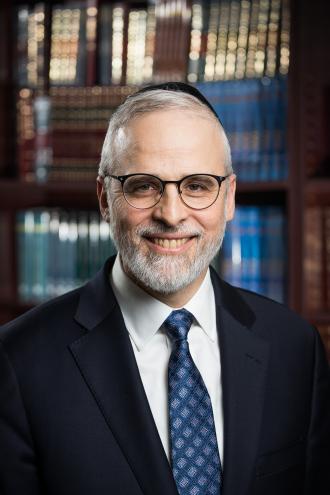This week’s parshah begins by mentioning the deaths of Nadav and Avihu, Aharon’s two sons. The Torah attests that Aharon silently accepted their deaths with perfect faith (10:3).
How did Aharon have the strength to do so? Additionally, what can we learn from his example?
Perhaps we can answer this by addressing another, more general question: why did suffering, like the Holocaust, happen to our nation? Furthermore, how could Hashem, Who is completely benevolent in all that He does, allow suffering in this world in general?
During the nightmare of World War 2, the accursed Nazis captured R’ Elchonon Wasserman and martyred him. An eyewitness reported the powerful words that R’ Elchonon spoke during those dreadful final days in hiding, when he was asked to explain why these horrors were befalling the Jewish people. R’ Elchonon responded with the following parable:
Just imagine the scene; an urban businessman who knew nothing about agriculture came to a farmer and asked to be taught about the art of farming. The farmer took him to a field and asked him what he saw. "I see a beautiful piece of land, lush with grass and pleasing to the eye", the visitor replied. He then watched aghast as the farmer plowed the grass and turned the beautiful green field into a mass of shallow brown ditches. "Why did you ruin the field?" he demanded. "Be patient. You will see," said the farmer. Then the farmer took a sackful of kernels of wheat and walked up and down the furrows he had just plowed, dropping kernels into the open ground and covering them with soil. "Are you insane?" the man demanded. "First, you destroyed the field and then you ruined the grain!". "Be patient. You will see". Time went by and once more the farmer took his guest out to the field. Now they saw endless straight rows of green stalks sprouting up from all the furrows. The visitor smiled broadly. "I apologize. Now I understand what you were doing. You made the field more beautiful than ever. The art of farming is truly marvelous". "No," said the farmer "we are not done. You must still be patient". More time went by, and when the stalks were fully grown the farmer chopped them down, crushed them until they became a mass of straw and loose kernels and ground the kernels into formless “dust”. His visitor watched open mouthed as the beautiful stalks became an ugly scene of destruction. The farmer then took some of the “dust”, mixed it with water, and fashioned the "mud" into the shape of a loaf. The visitor saw the perfectly formed loaf and smiled broadly, but his happiness did not last for long. The farmer kindled a fire in the oven and placed the loaf inside. "Now I know that you are insane. After all of that hard work, you are burning it all! The farmer only laughed. "Have I not told you to be patient?". At last, the farmer opened the oven and took out a freshly baked bread - crisp and brown, with an aroma that made the visitor's mouth water. "Come," the farmer said. He placed the loaf on the kitchen table, cut it, and offered his now-pleased guest a liberally buttered slice. "Now," he said, "you finally understand”.
R’ Elchonon concluded: G-d is the Farmer, and we are the simpletons who cannot begin to understand His ways or the outcome of His plan. Only at the great festive banquet in the times of Moshiach, when the process is complete, will the Jewish people know and understand why everything has happened and all the infinite good that it brought about. Then, when Moshiach has finally come, we will know why even those events that seemed destructive and painful were part of a process that really produced goodness and beauty (for more on this subject, see “A Divine Madness” by R’ Avigdor Miller).
How could Aharon muster the strength to remain silent in the face of one of his most challenging tests? There can only be one answer; he had perfect faith in Hashem. He spent his lifetime internalizing with every fiber of his being that G-d is always in absolute control, that He is kind and benevolent in all of His ways, and, just as importantly, that man is not always granted an understanding of His beautiful and kind Master plan during his lifetime.
Living Inspired
Often, we aren’t privileged to see Hashem’s big picture, which can cause His ways to appear confusing, even contradictory at times. However, we must understand that we are only granted a brief lifetime to make sense of His masterpiece which spans many millennia. One day, when we see the big picture, we will understand that things are not always as they seem and that even what looks like pain and suffering, are really precise acts of absolute kindness and blessing *.
Whether we are dealing with unfortunate suffering or just having a rough day, may we internalize Aharon’s example and these many lessons and understand that everything that happens to us is from a loving and caring G-d who has everything under His absolute control. May our complete faith in Hashem’s kindness and involvement in our personal lives be strengthened, and may we merit to feast on Hashem’s bread at the festive meal at the time of Moshiach when everything will become clear.
Gut Shabbos
____________________
*- A perfect historical illustration of this fact is the story of Purim. For imagine if someone passed away right before the Purim miracle occurred. He would see the Jews being sentenced to annihilation, including righteous men like Mordechai. He would see the virtuous Esther, one of the holiest women in history, being forcefully taken as a queen to an evil tyrant. He would see Haman, an evil man, prospering with wealth and honor. This man may very well have questioned Hashem and His providence in daily life. But, with this episode, we have the rare benefit of actually seeing the end of the story and understanding that every single last detail was for OUR ABSOLUTE BENEFIT! Our very prosecution is what sparked one of the greatest teshuva (repentance) movements in history, and transformed a nation that was beginning to abandon their Judaism into the nation that re-accepted the Torah and built the 2nd Bais HaMikdash. Esther’s being taken as queen was a pivotal event that helped save us, and the great merits she accomplished by being queen is her eternal legacy. Even Haman’s fortune was really for our good. It made the kiddush Hashem of his downfall that much greater. Additionally, ultimately his entire fortune was given to none other than Mordechai and Esther. These events teach us that when we merit to witness Hashem's big picture we will see with absolute clarity that everything that happens, even those things that seem “bad” to our simple understanding, are brilliantly precise acts of blessing and kindness from Hashem.















